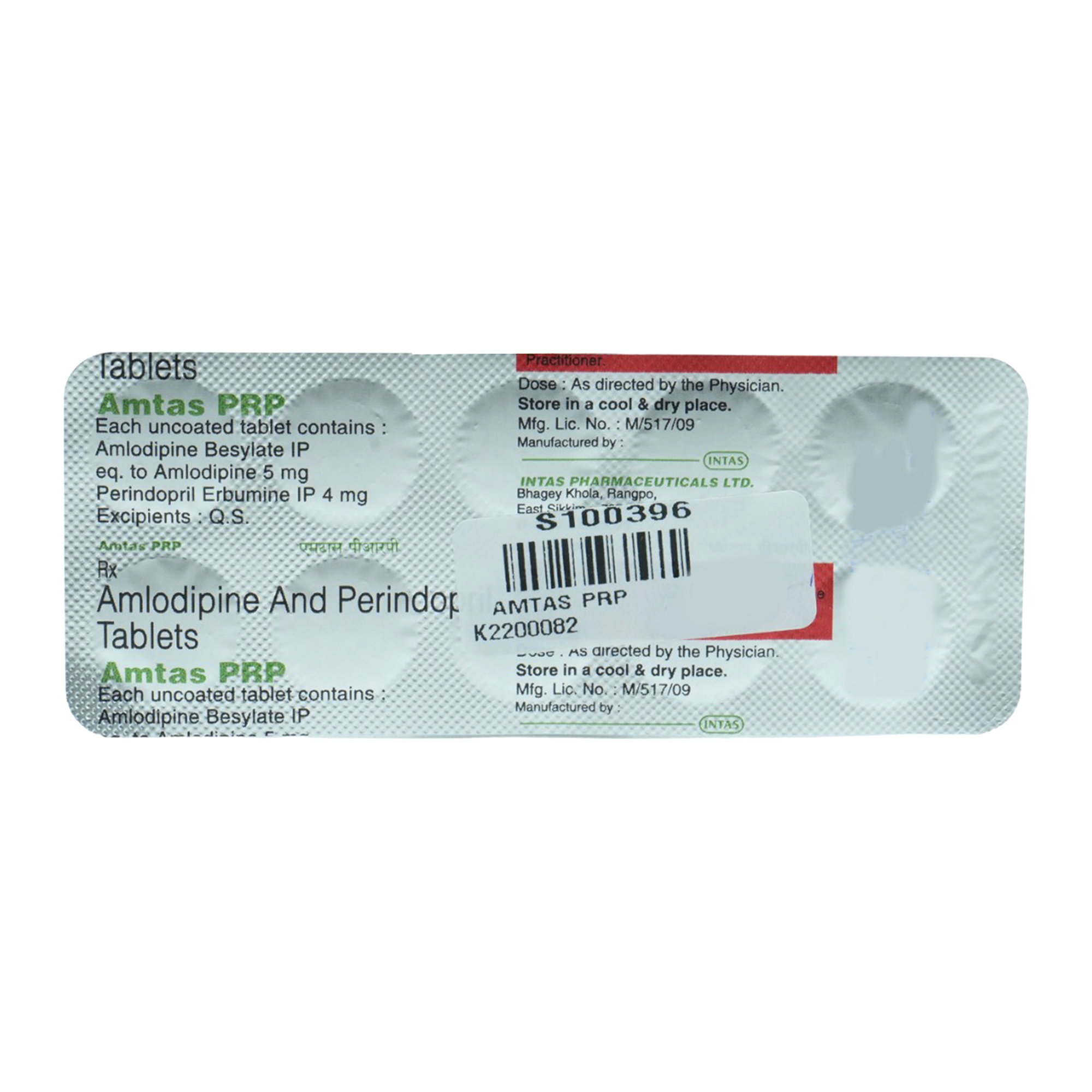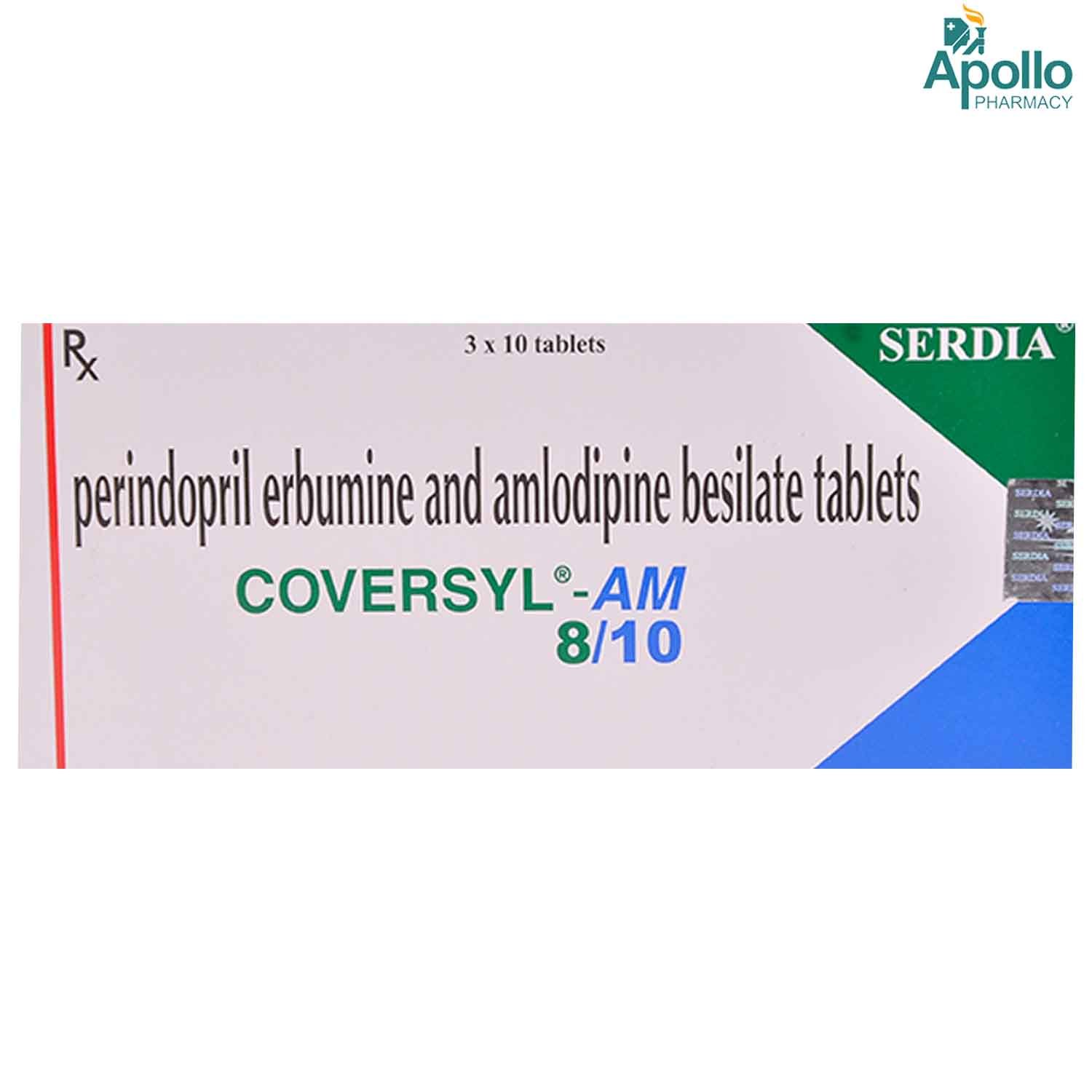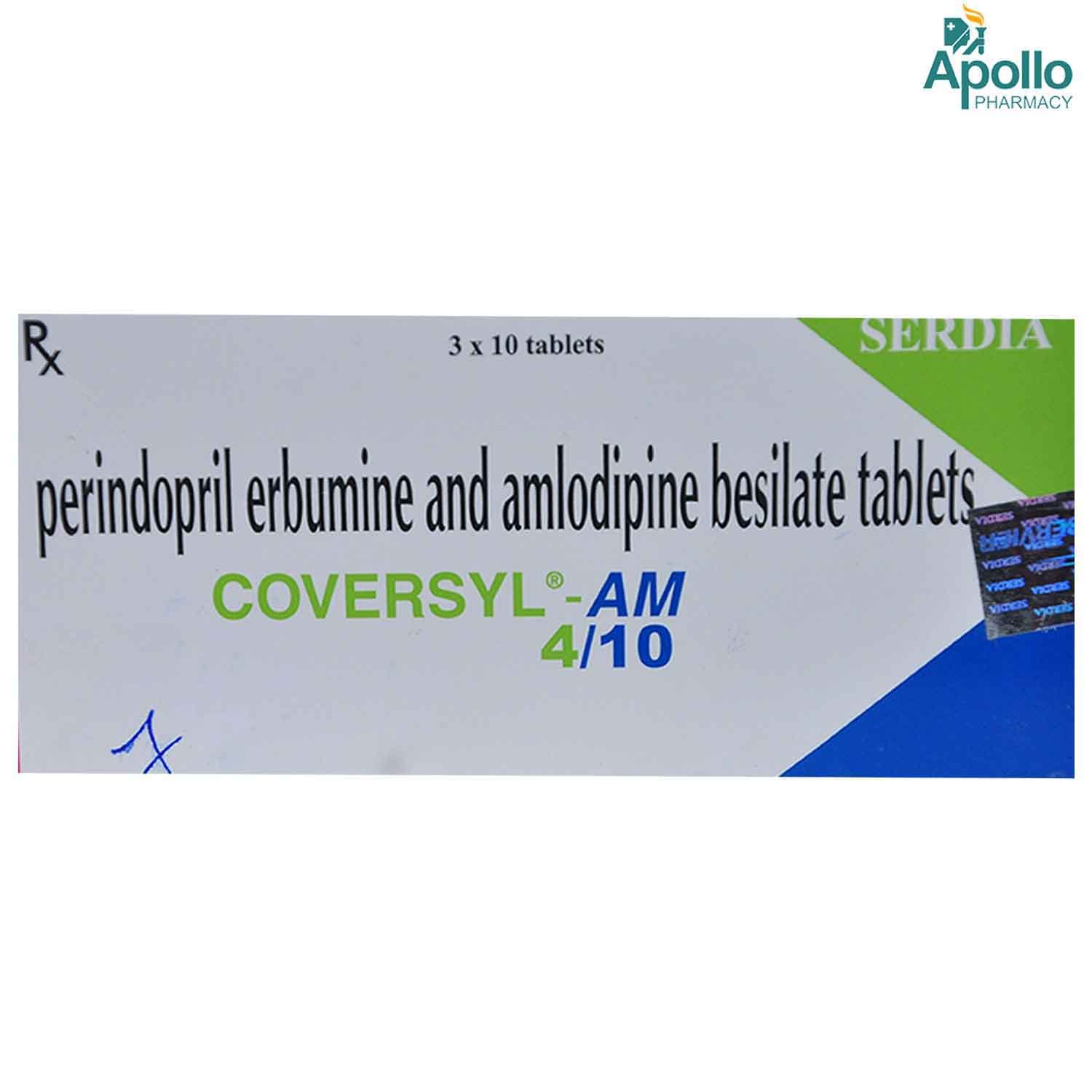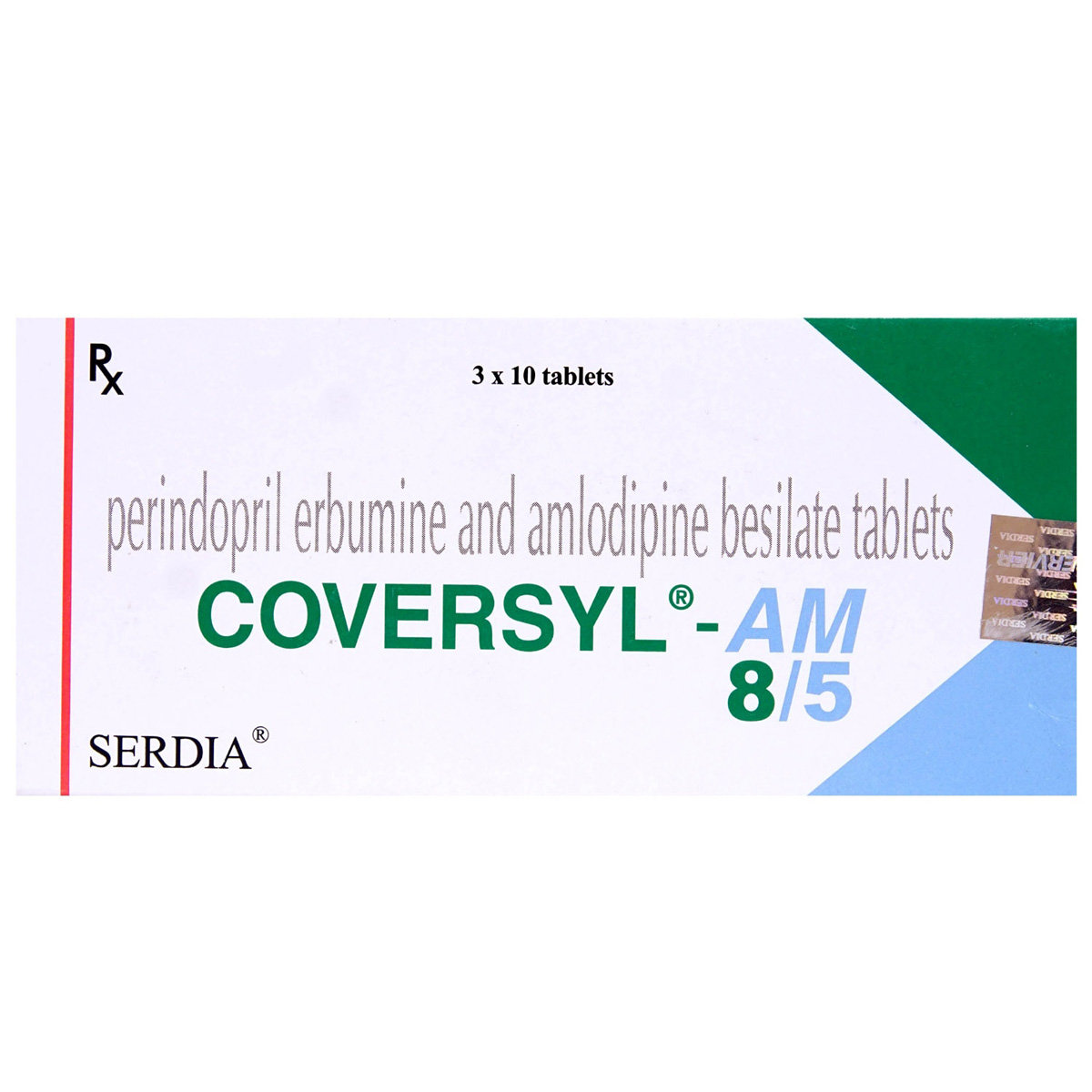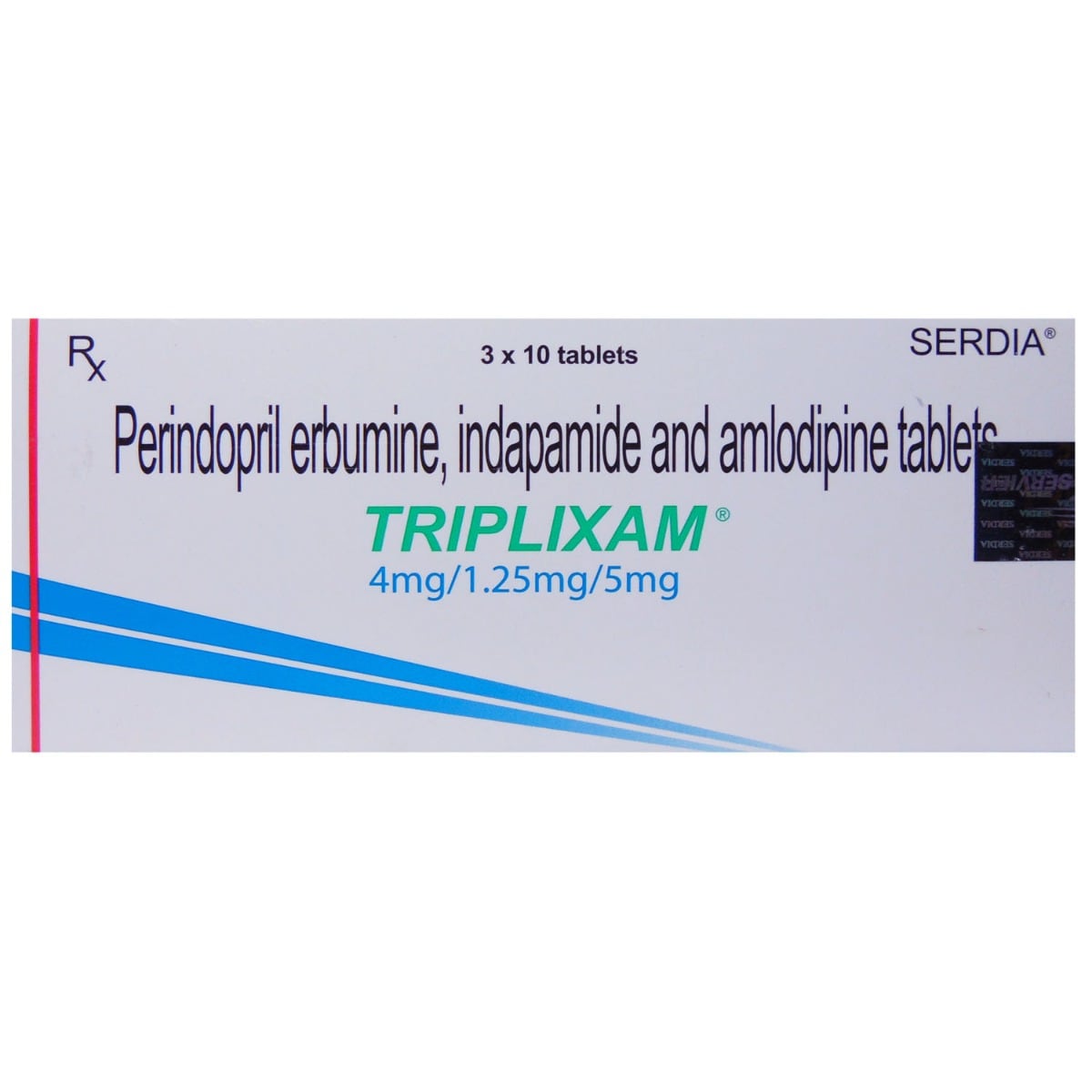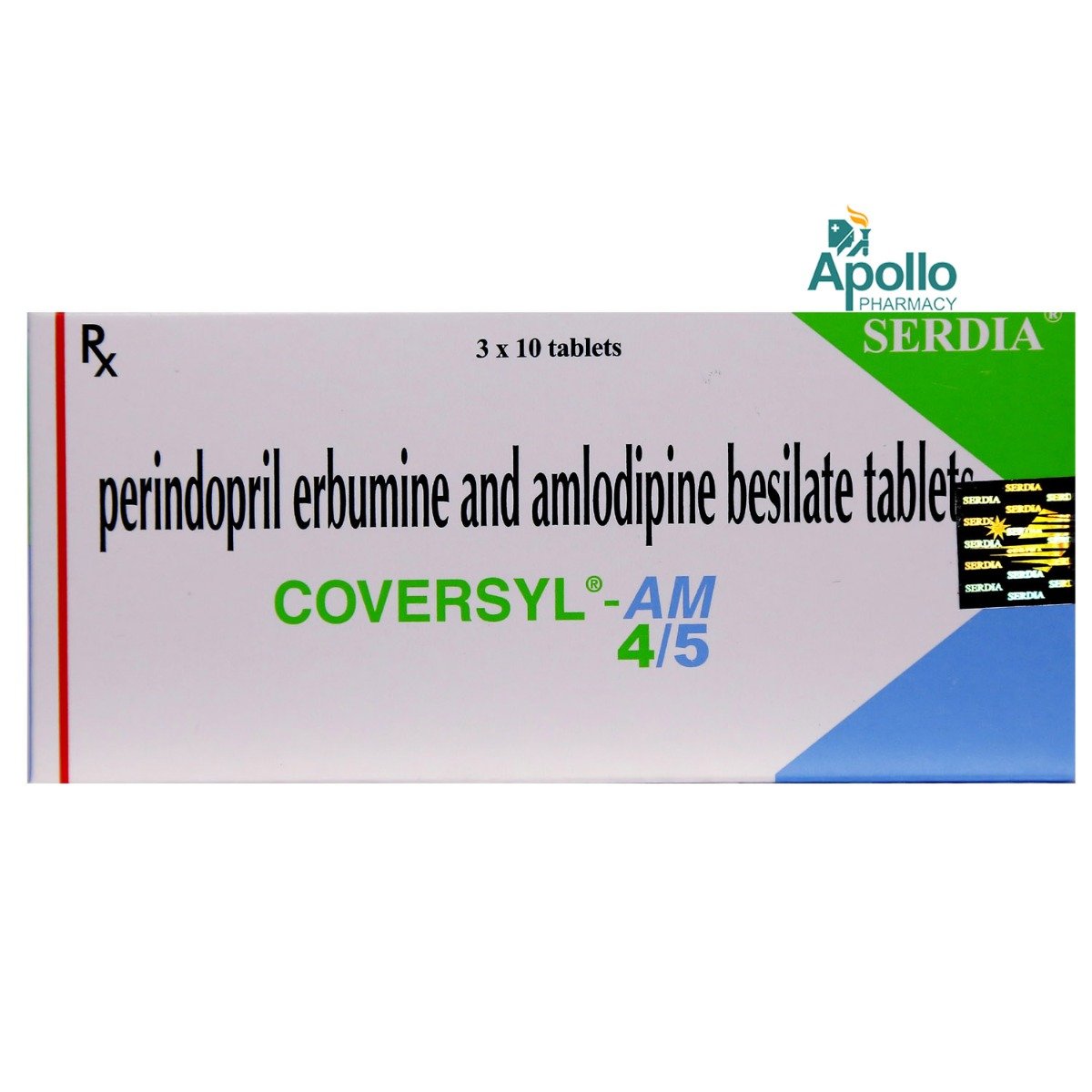Amlodipine+perindopril Erbumine
About Amlodipine+perindopril Erbumine
Amlodipine+perindopril Erbumine is used to treat high blood pressure (hypertension). Additionally, it is also used to treat stable coronary artery disease. High blood pressure is a condition in which the blood exerts increased pressure on the walls of blood vessels. Stable coronary artery disease is a condition in which the blood supply to the heart is blocked or reduced.
Amlodipine+perindopril Erbumine contains Amlodipine and Perindopril. Amlodipine relaxes blood vessels, so that blood passes through them easily, thereby lowering the blood pressure. Perindopril relaxes and widens the blood vessels.
You may experience certain side effects like ankle swelling, tiredness, headache, palpitations (irregular heartbeat), sleepiness, cough, flushing, taste change, and upset stomach. Most of these side effects do not require medical attention. However, talk to your doctor if the side effects persist or worsen.
Amlodipine+perindopril Erbumine is not recommended during early pregnancy and should not be taken when more than 3 months pregnant, as it may cause serious harm to the baby. Amlodipine+perindopril Erbumine is not recommended for breastfeeding mothers and children. If you have angioedema (Painless swelling under the skin) or diabetes, then inform your doctor immediately. Reduce the amount of table salt (sodium chloride) in your food.
Uses of Amlodipine+perindopril Erbumine
Medicinal Benefits
- Amlodipine+perindopril Erbumine is a combination of two drugs: Amlodipine and Perindopril erbumine.
- Amlodipine is a 'calcium channel blocker' and treats high blood pressure, Prinzmetal's or variant angina (chest pain), and other conditions caused by coronary artery disease.
- It relaxes blood vessels, allowing blood to pass through them easily, thereby lowering blood pressure.
- It also treats chest pain by improving the blood supply to the heart muscle, allowing it to receive more oxygen.
- Amlodipine also improves a person's tolerance to exercise and keeps the blood pressure at acceptable levels.
- Perindopril is an angiotensin-converting enzyme (ACE) inhibitor, which reduces increased blood pressure by blocking a naturally occurring substance known as angiotensin II (that tightens your blood vessels).
- It relaxes and widens the blood vessels. This lowers your blood pressure and makes it easier for your heart to pump blood around your body.
- Amlodipine+perindopril Erbumine does not cure high blood pressure (hypertension) but does help control it.
- In addition to this, Amlodipine+perindopril Erbumine also reduces the physical effects of anxiety.
Directions for Use
- Amlodipine+perindopril Erbumine can be taken before food for better absorption.
- It is recommended to take Amlodipine+perindopril Erbumine once daily in the morning or as advised by your doctor.
- Swallow the Amlodipine+perindopril Erbumine as a whole with a glass of water.
- Do not chew, crush, or break it.
Storage
Side Effects of Amlodipine+perindopril Erbumine
- Oedema
- Headache
- Dizziness
- Flushing
- Light-headedness due to low blood pressure
- Tiredness
- Weakness
- Nausea
- Vomiting
Drug Warnings
- Do not take Amlodipine+perindopril Erbumine if you are allergic to any of its contents.
- Also, avoid taking Amlodipine+perindopril Erbumine if you have angioedema, severe water retention, low blood pressure, or low blood potassium.
- Inform your doctor if you have diabetes, heart problems, gout, parathyroid gland problems, heart failure, collagen disease, atherosclerosis (hardening of arteries), excess acid in the blood, liver/kidney problems, if you are on a low-salt diet, if you are taking lithium/potassium-sparing diuretics, or if you are taking any other blood pressure-lowering medicines.
- Amlodipine+perindopril Erbumine is not recommended during early pregnancy and should not be taken when more than 3 months pregnant as it may cause serious harm to the baby.
- Amlodipine+perindopril Erbumine is not recommended for breastfeeding mothers and children.
- Amlodipine+perindopril Erbumine may cause dizziness, so drive with caution.
- Keep your doctor informed about your health condition and medications to rule out any interactions.
Drug Interactions
Drug-Drug Interactions: Inform the doctor if you are taking anti-maniac drug (lithium), muscle relaxer (dantrolene), anti-cancer (estramustine), drugs used to treat heart failure (sacubitril+valsartan), potassium-sparing drugs (triamterene, amiloride), anti-hypertensive (aliskiren), anticoagulant (heparin), antibiotic (trimethoprim+sulfamethoxazole), potassium-sparing drugs (eplerenone, spironolactone).
Drug-Food Interactions: Avoid consuming grapefruit and grapefruit juice whilst taking Amlodipine+perindopril Erbumine as it might increase the blood levels of amlodipine; this can lead to an unpredictable increase in the blood pressure-lowering effect of Amlodipine+perindopril Erbumine. Inform your doctor if you are taking St. John's wort (a herbal supplement).
Drug-Disease Interactions: Inform the doctor if you have angioedema, severe liver/kidney problems, liver encephalopathy, severe water retention, low blood pressure, heart failure, or low blood potassium.
Drug-Drug Interactions Checker List:
Safety Advice

Alcohol
unsafeAvoid consuming alcohol as it might cause increased dizziness.

Pregnancy
unsafeAmlodipine+perindopril Erbumine is not recommended during early pregnancy and should not be taken when more than 3 months pregnant as it may cause serious harm to the baby. Please consult your doctor if you are pregnant, think you are pregnant or planning for pregnancy.

Breast Feeding
unsafeAmlodipine+perindopril Erbumine is not recommended for breastfeeding mothers. Talk to your doctor if you have any concerns.

Driving
cautionAmlodipine+perindopril Erbumine may cause dizziness, do not drive or operate heavy machinery if you feel dizzy.

Liver
consult your doctorDose adjustment may be needed. Please consult your doctor if you have liver problems or any concerns regarding this. Avoid taking Amlodipine+perindopril Erbumine if you have severe liver disease or hepatic encephalopathy.

Kidney
consult your doctorDose adjustment may be needed. Avoid taking Amlodipine+perindopril Erbumine if you have severe kidney problems. Please consult your doctor if you have kidney problems or any concerns regarding this.

Children
unsafeAmlodipine+perindopril Erbumine is not recommended for children as safety and effectiveness have not been established.
Habit Forming
Diet & Lifestyle Advise
- Keep your weight under control with body mass index (BMI) between 19.5 and 24.9.
- Do regular physical activity or exercise for at least 150 minutes per week, or about 30 minutes most days of the week. Doing this can help you to lower your raised blood pressure by about 5 mm of Hg.
- Limit sodium chloride intake (table salt) in your daily diet to 2300 mg per day or less than 1500 mg is ideal for most adults.
- If you are taking alcohol, use only one serving for women and two servings for men.
- Quit smoking to lower the risk of heart diseases.
- Avoid chronic stress as it can raise your blood pressure. Try to enjoy and spent time with your loved ones to cope with stress.
- Monitor your blood pressure daily, and if you notice any fluctuations frequently, please contact your doctor immediately.
- Try including heart-healthy omega 3 fatty acid-containing foods in your daily diet. You can also use low-fat cooking oils like olive oil, soybean oil, canola oil, and coconut oil to lower your elevated blood pressure.
Special Advise
- Regular monitoring of blood pressure levels, kidney function and electrolyte levels while taking Amlodipine+perindopril Erbumine is advised.
- If you are due to undergo any surgery, inform the doctor that you are taking Amlodipine+perindopril Erbumine.
Patients Concern
Disease/Condition Glossary
High blood pressure (hypertension): It is a condition in which the blood exerts increased pressure on the walls of blood vessels, leading to hypertension. This condition can lead to hardened arteries (blood vessels), decreasing the blood and oxygen flow to the heart. Raised blood pressure can cause chest pain (angina) and heart attack (when the blood supply to the heart is blocked). High blood pressure also causes brain damage (stroke) and kidney failure. Symptoms of high blood pressure include headache, dizziness, nose bleed, changes in vision, chest pain, weakness and dyspnoea (shortness of breath). However, most of the time, the signs and symptoms of hypertension are none.
Stable coronary artery disease: It is a condition in which the blood supply to the heart is blocked or reduced. Atherosclerosis (build-up of plaque in the arteries) is the main cause of stable coronary artery disease.
FAQs
Amlodipine+perindopril Erbumine is used to treat high blood pressure (hypertension). Additionally, it is also used to treat stable coronary artery disease.
Amlodipine+perindopril Erbumine contains Amlodipine and Perindopril erbumine. Amlodipine relaxes the blood vessels, thereby improving blood flow. Perindopril erbumine widens the blood vessels; this makes it easier for the heart to pump blood through them. Together, Amlodipine+perindopril Erbumine helps treat high blood pressure.
Amlodipine+perindopril Erbumine may cause palpitations, a sensation that the heart is racing, pounding, or fluttering. A minor fluctuation should not be a worry; however, if palpitations continue or you begin to feel unwell, speak with your doctor.
High blood pressure increases the workload on the arteries and heart. If untreated, it could damage the blood vessels of the heart, brain, and kidney and might result in stroke, heart failure or kidney failure. Hypertension increases the risk of heart attacks. Therefore, anti-hypertensives such as Amlodipine+perindopril Erbumine are used to lower the blood pressure to normal; this reduces the risk of developing these disorders.
Do not stop taking Amlodipine+perindopril Erbumine without consulting your doctor, as it may lead to a rise in blood pressure. To treat your condition effectually, continue taking Amlodipine+perindopril Erbumine for as long as your doctor has prescribed it. Do not be reluctant to speak with your doctor if you experience any difficulty while taking Amlodipine+perindopril Erbumine.
Light-headedness could be a side-effect of Amlodipine+perindopril Erbumine. It occurs due to low blood pressure leading to dizziness on standing. If you experience this, do not try to stand up suddenly or start walking; instead, lie down and get up slowly only when you feel better. People taking Amlodipine+perindopril Erbumine are advised to regularly monitor their blood pressure levels to avoid unpleasant events.
Avoid consuming grapefruit and grapefruit juice whilst taking Amlodipine+perindopril Erbumine as it might increase the blood levels of amlodipine; this can lead to an unpredictable increase in the blood pressure-lowering effect of Amlodipine+perindopril Erbumine. Inform your doctor if you are on a salt-restricted diet, use salt substitutes or if you are taking potassium supplements.
Amlodipine+perindopril Erbumine can affect kidney function, especially in individuals with pre-existing kidney conditions or those taking certain medications. Please consult your doctor if you have kidney problems or concerns, as dose adjustments may be needed.
The best time to take Amlodipine+perindopril Erbumine is typically in the morning, as it helps control blood pressure throughout the day. However, depending on your individual needs and medical conditions, your doctor may sometimes recommend taking it at bedtime. Consistency is key, so take it at the same time every day. Always follow your doctor's personalized instructions.
Amlodipine + Perindopril Erbumine contains two active ingredients: Amlodipine, a calcium channel blocker, and Perindopril Erbumine, an angiotensin-converting enzyme inhibitor. Together, they provide therapeutic benefits.
Do not stop taking Amlodipine+perindopril Erbumine as stopping it suddenly may cause your blood pressure to rise again, increasing the risk of heart attack or stroke. Therefore, please consult your doctor before stopping the medication to avoid potential health risks.
If you forget to take Amlodipine+perindopril Erbumine, take it as soon as you remember. However, if it is almost time for your next dose, skip the missed dose and continue with your regular dosing schedule. Do not double the dose.
Amlodipine+perindopril Erbumine is not recommended during early pregnancy and should not be taken when more than 3 months pregnant, as it may cause serious harm to the baby. It is also not recommended for breastfeeding mothers and children. Amlodipine+perindopril Erbumine may cause dizziness, so drive or operate heavy machinery with caution. Avoid consuming alcohol, as it might cause increased dizziness. Inform your doctor about all your medicines and pre-existing health conditions to rule out any unpleasant side effects.
Do not drink alcohol while taking Amlodipine+perindopril Erbumine as it may cause unpleasant side effects. Please consult a doctor for personalized advice.
Accidentally taking more than the prescribed dose of Amlodipine+perindopril Erbumine may lead to low blood pressure (hypotension), which can cause dizziness or fainting. In such cases, lying down with your legs elevated and seeking immediate medical attention is essential. Contact your doctor or visit the nearest emergency department without delay.
Amlodipine+perindopril Erbumine is usually prescribed for daily use to manage blood pressure and heart conditions. However, always follow the instructions of your doctor regarding dosage and duration to ensure safe and effective treatment.
Yes, Amlodipine+perindopril Erbumine may cause ankle swelling as a common side effect. This medication contains amlodipine, which is known to cause peripheral oedema (swelling of the ankles or feet) in some patients. If you experience significant or persistent swelling, it is crucial to consult your doctor for further evaluation and management.
The common side effects of Amlodipine+perindopril Erbumine include cough, dizziness, headache, and swelling in your hands or feet. Most of these side effects gradually resolve over time. However, consult the doctor if any of these symptoms persist or worsen.


